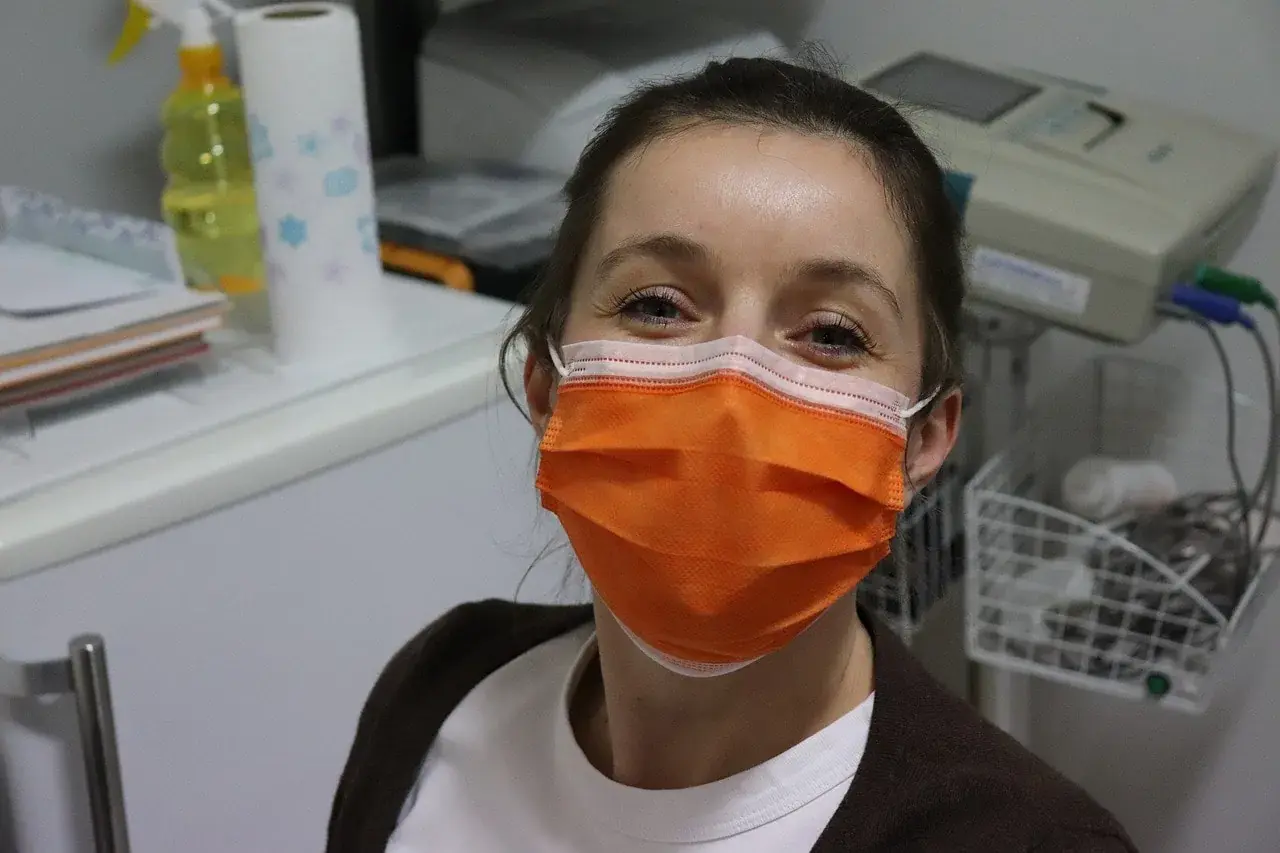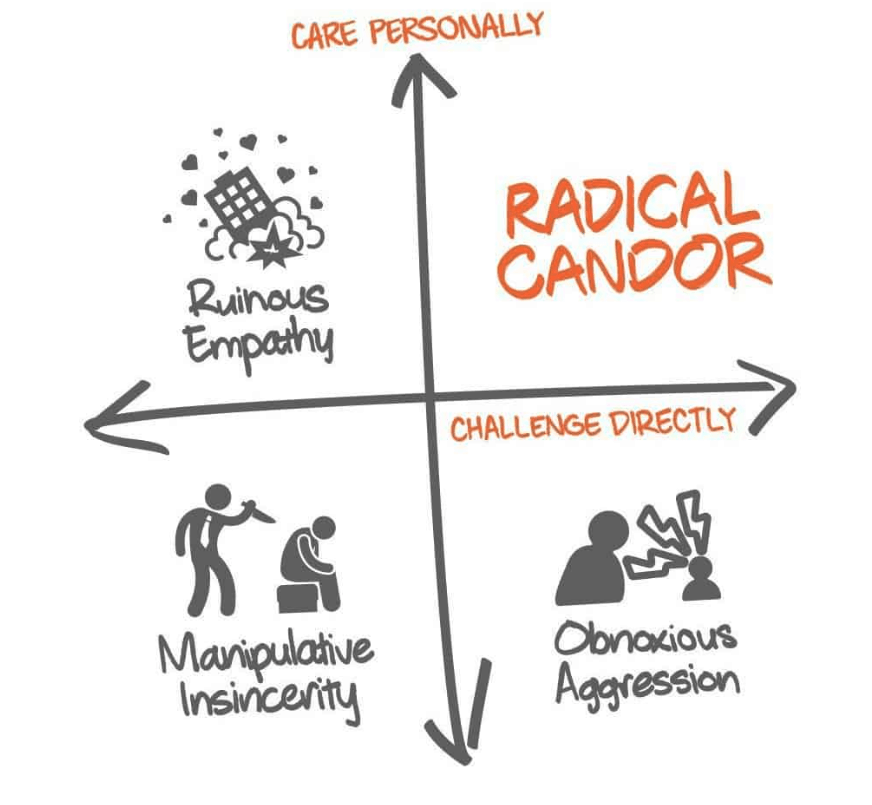3 Ways to Introduce Radical Candor's Feedback Framework to Your Organization
When we talk about Radical Candor at companies or with individuals, we see a lot of heads nodding in agreement. People understand that Radical...
8 min read
Radical Candor Oct 6, 2022 11:51:57 AM

This post about feedback in healthcare as an act of caring was contributed by Sue Tetzlaff, RN, RHIA, MHA, FACHE, co-founder and principal of Capstone Leadership Solutions.

My husband started our Friday night dinner conversation with “guess what happened today?”
I just never know what is going to be on the other end of that question when posed by my husband at the end of his full workday as a family medicine physician. So I respond with “I’m sure I could never guess. Do tell.”
He went on to share that while he was getting ready to leave the hospital, he walked through the cafeteria to grab a cup of coffee. He was alone in the main dining area until another physician joined him. Given that it was Friday, my husband took this opportunity to discuss treatment updates about his hospitalized patients with this other physician who would be caring for these patients over the weekend.
My husband was not aware that even though they were seemingly alone in the dining area, there was a newly hired dietary aide around the corner that could overhear snippets of their discussion of sensitive patient information, which is a no-no in healthcare.
The dietary aide approached my husband and his physician colleague and stated, “I noticed that you are discussing patient information in a public location which is not in keeping with our high standards for patient confidentiality. Could you please take your coffee and conversation to the physician's lounge?”
Through frequent, well-timed, and well-intended feedback — offered up freely and welcomed graciously as an act of caring — healthcare organizations can supercharge their efforts to create a positive work environment where people feel appreciated, accountable, supported, cared for and noticed."
After describing this incident to me, my husband finished with “Isn’t this GREAT!? This was a brand-new dietary aide who approached two very senior members of the medical staff and called us out on our behavior. This is so GREAT! This would have never happened five years ago and now it just feels normal, even welcomed and appreciated.”
I am co-founder and principal of Capstone Leadership Solutions, a firm specializing in assisting healthcare leaders and their teams achieve extraordinary patient, employee, and business results, and much to my husband’s chagrin, I’ve shared this story with many audiences of healthcare workers; after which, I ask, “Would the actions of this dietary aide be a typical occurrence where you work?”
Most often, the answer is a resounding “no!”
Certainly, healthcare audiences are savvy enough to know that having a healthy feedback culture doesn’t “just happen.” There is a pathway there, and they want to be on it.
While evolving a company’s feedback culture is a complex undertaking, through our work with dozens of healthcare organizations, we have identified three essential actions on the pathway for doing this and doing so in such a way that it will likely evolve even faster than was the case in the hospital that my husband works at.

In the healthcare organizations that we support in wide-scale transformation initiatives targeted at continually improving patient, employee and business outcomes, we recommend the adoption of nine core leadership competencies. Giving and receiving feedback is one of them.
For each leadership core competency, the organization designates two or more leaders to serve as “internal peer champions.” As such, these champions are trainers and resources for their peers, which supports easy access to experts in the skill of feedback and the ability to offer a frequent cadence of internal leadership development.
When circling back to the story of the healthcare organization where my husband works, their primary approach to building their feedback culture was focused on efforts to support all leaders in mustering the will and mastering the skill of giving and receiving feedback.
What organically arose as leaders gained competence and consistency in giving impactful feedback is that leaders were also serving as role models to employees. In response, employees started using these same feedback techniques used by leaders to also provide compliments to offer sincere praise and callouts to communicate helpful criticism to their peers and others.
Unfortunately, this organic process of employees embracing the responsibility of giving feedback, which arose from the dedicated leadership development efforts, took many years.
While this “leaders go first” approach is a proven one that many organizations have benefited from, there are exponential positive benefits when feedback expectations and abilities are expanded beyond the scope of leaders. This led us to partner with dozens of healthcare organizations to design earlier intentional approaches to fostering the development of these skills by everyone in the organization.
 Newsletter Image
Newsletter Image
Empowering and equipping everyone in the organization to provide in-the-moment feedback is a very useful tactic for achieving great results by continually elevating behavior and performance and fostering successful teams and change initiatives.
Employees have a heightened level of receptiveness to learning and applying new skills when these efforts are spearheaded by their peers. In essence, if the improvement desired requires all employees to change how they behave or perform, it is best accomplished by the organization adopting a “doing it WITH them, not TO them” approach.
For decades, the work and research of Dr. John Kotter, Harvard Business School professor and entrepreneur, has supported the success of guiding coalitions or “volunteer armies” to join together individuals that bring expertise, energy and perspective from across a variety of areas to serve as the social leaders of change and cultural advancement initiatives.
Such a team, made up of a representative group of the employees in the organization, can be empowered and supported to own the responsibility of inspiring and equipping employees as to the what, why, and how of giving and receiving feedback. Tactics this team may use include:
As well, a dedicated employee-driven team serves to champion the long-term process of "normalizing" and “branding” feedback in the workplace culture as an act of caring.

To elevate the quality and quantity of feedback in an organization, leaders and employees alike may require a shift in mindset to support them in mustering the will to give frequent and impactful feedback.
Many people have a “love-hate” relationship with feedback. Sheila Heen and Douglas Stone, in their Harvard Business Review article, offer up this insight: “The [feedback] process strikes at the tension between two core human needs — the need to learn and grow, and the need to be accepted just the way you are.”
We’ve probably all heard the saying “If you don’t have anything nice to say, don’t say anything at all.” This mindset stops us in our tracks when we hold on to the belief that giving feedback is not nice, and Radical Candor and Just Work author Kim Scott cites this as the reason people often fail to challenge directly.
However, when people shift their mindset from “feedback is not nice” to “feedback is an act of caring,” this can unlock their feedback potential.
By way of this simple scenario, “I noticed that you have spinach in your teeth,” often used by Scott, employees open up to the possibility that it is more caring and helpful to speak up than to stay quiet.
When delivered well and with the right intent, feedback is, at its core, a caring gesture. It demonstrates care for each other, the work environment, necessary improvement and change efforts, defined behavior and work standards, and most importantly, the care of patients.
Feedback would be uncaring if driven by an intent to be perceived as “superior” or “better than” — or to blame, shame, or deflate others. This is not caring feedback, this is manipulative insincerity.
Over time, “noticing, and then giving sincere, specific feedback in response to what was noticed,” can be normalized or re-branded as an act of caring.
“Noticing” is the first step in the feedback process. Caring enough to notice the behavior or performance that is desired or improving and then caring enough to communicate a sincere and impactful compliment. As well, as caring enough to notice behavior or performance that is not meeting our established high standards, and then caring enough to call it out.
In the healthcare industry, the value of “caring” is one that deeply resonates with those who are attracted to working in the service of others. As well, the skill of “noticing” or assessing is a well-honed skill of healthcare workers. Therefore, connecting “noticing” and “caring” to the organization-wide approach to elevating the feedback culture resonates with the healthcare workforce.
Healthcare organizations depend on the efforts of caring people every day. And in this spirit of caring, healthcare workers can more freely and comfortably offer up feedback and welcome it as a caring gesture from others.
TIPS FOR CARING FEEDBACKTIP #1: Be specific as you describe what is being complimented or called out. Starting this conversation with “I noticed” – “I heard” – “I saw” – or “I discovered” can help you in being more specific when giving feedback. With compliments, being specific allows the receiver to know exactly what is being recognized and reinforced. And when a call out is specific, it makes it easier for people to know exactly what is being called out so that it can be changed or improved upon. In the words of Brene Brown … “clear is kind, unclear is unkind.” TIP #2: Before jumping right into a call-out, ask permission by opening the conversation with a question…such as “I noticed something I’d like to share with you. Do you have a minute now to talk about it?” TIP #3: A great way to end a compliment and call out is with a question that sparks a conversation. When complimenting, you could ask if they’d share their tips for success. After a call out, you could ask: “What ideas do you have for making this better?” “What might be causing your struggle with this?” or “How can I help?” These questions are motivated by caring. TIP #4: To keep your relationships and the work environment positive, strive to give three times more compliments than callouts over the course of time. TIP #5: The most appropriate response to a compliment or call out is to simply say “THANK YOU!” When we don’t receive feedback well, people will stop giving it … which blocks our opportunities to learn and improve. TIP #6: Get better at receiving feedback by asking for it more often, and from many different coworkers. Poster Image |
In far too many healthcare organizations, it is rare for a brand new dietary aide to feel empowered and equipped to call out senior medical staff members; and in return, for it to be well received by those medical staff members.
Fortunately, the pathway is available to those organizations that are willing to prioritize it as part of their cultural evolution. Specific tactics they can employ include:
Effective and caring methods for giving and receiving feedback are superpowers that yield many benefits for individuals, work units, entire organizations and the patients they serve.
Through frequent, well-timed, and well-intended feedback — offered up freely and welcomed graciously as an act of caring — healthcare organizations can supercharge their efforts to create a positive work environment where people feel appreciated, accountable, supported, cared for and noticed.
Need help with Radical Candor? Let's talk! >>
————————————————————————————————————————————————————————————–
Sue Tetzlaff, RN, RHIA, MHA, FACHE is the co-founder and principal of Capstone LeadershipSolutions, a firm specializing in assisting healthcare leaders and their teams achieve extraordinary patient, employee, and business results while reconnecting to pride, purpose, and joy. Sue co-authored the book, The Employee Experience: A Capstone Guide to Peak Performance. Prior to co-founding Capstone, she served as a healthcare executive for more than 20 years as a Vice President of Quality, Chief Nursing Officer, Interim CEO, and Chief Operating Officer.
Need help practicing Radical Candor? Then you need The Feedback Loop (think Groundhog Day meets The Office), a 5-episode workplace comedy series starring David Alan Grier that brings to life Radical Candor’s simple framework for navigating candid conversations.
You’ll get an hour of hilarious content about a team whose feedback fails are costing them business; improv-inspired exercises to teach everyone the skills they need to work better together, and after-episode action plans you can put into practice immediately to up your helpful feedback EQ.
We’re offering Radical Candor readers 10% off the self-paced e-course. Follow this link and enter the promo code FEEDBACK at checkout.

When we talk about Radical Candor at companies or with individuals, we see a lot of heads nodding in agreement. People understand that Radical...

There are four simple steps for how to give and receive feedback you need to excel at work. You might call it the solution to your feedback wipeouts....

According to Gallup's Leadership and Management Indicator, only 21% of employees in the U.S. trust the leadership in their organization. In addition,...